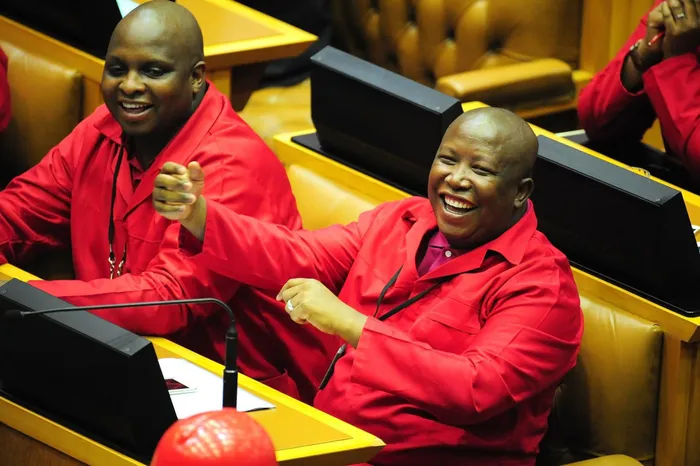Shivambu: EFF’s disruptive behaviour in Parliament was childish’ and ‘senseless,’ that’s why l left

Former Economic Freedom Fighters (EFF) deputy president Floyd Shivambu says he was never comfortable with the party’s disruptive behaviour in Parliament during his decade-long tenure, calling it “childish” and without purpose.
Image: Phando Jikelo
Former Economic Freedom Fighters (EFF) deputy president Floyd Shivambu says he was never comfortable with the party’s disruptive behaviour in Parliament during his decade-long tenure, calling it “childish” and without purpose.
Shivambu, who is now the national convenor of the Mayibuye Consultation Process, said on Thursday that even if the uMkhonto weSizwe (MK) Party had not existed, he would have still left the EFF.
“One of the things I was not comfortable with throughout my 10 years in Parliament was the culture of disruption and rootedness that characterised those we served with,” he said during an event in Midrand.
“All of those things were just planned, like in a childish way, with no purpose.”
However, upon his arrival at the party, it emerged that many members did not support him, and his time there was short-lived.
Shivambu’s name was excluded from the party’s parliamentary list after his dramatic removal as secretary-general.
His dismissal as secretary general followed a controversial Easter trip to Malawi, where he attended a church service led by fugitive preacher Shepherd Bushiri.
MK Party leader Jacob Zuma later announced that Shivambu would be redeployed to Parliament, but that never materialised. Instead, he found himself sidelined.
Although Shivambu briefly joined the MK Party, he left within a short period, citing misalignment with its direction.
He has since launched the Mayibuye Consultation Process, a national engagement campaign with church leaders and community stakeholders to explore forming a new political party.
Shivambu has been critical of the EFF’s tactics in the legislature, accusing the leadership of orchestrating disruptions that served no strategic or tactical value.
“Sometimes even when there are areas of agreement, we would realise that on this question we can agree. So why don’t we sit down and reach consensus, and then raise our issues robustly?” he said.
“But the instruction would be, ‘No, today we’re going to disrupt.’”
He claimed the disruptions were not spontaneous but were planned behind closed doors.
“It was not something that happened spontaneously. It was planned in a meeting, and I can tell you now there was only one person who initiated the disruptions - it was not the leadership collectively.”
He suggested this approach was mistaken for radicalism.
“That was mistaken to be the so-called militancy and radicalism. And we kept asking, ‘How does this relate to voters on the ground, or to the people that sent us here?’”
Shivambu argued that such behaviour had contributed to the party’s loss of support in the last election.
“There were 600,000 fewer people who voted for that organisation because they realised, ‘We sent you to represent us there, but you are grandstanding.’”
He said his departure, along with that of other members, stemmed from these concerns.
“Even if there was no MK Party or any other alternatives, we were going to disassociate. We raised it internally: What is the strategic value? What is the tactical value, even, of wanting to be disruptive?”
He also said that the EFF’s younger members were adopting this confrontational style without understanding its consequences.
“The saddest thing is that the younger generations associating with that organisation, even in councils and legislatures, just go and disrupt for no reason. They engage in violence and believe that’s being revolutionary because the leader says so.
“What kind of revolution is that? That’s disruption, even when it’s senseless.”
Shivambu said his proposed party, Mayibuye iAfrika, would not follow that model.
“One of the things that will never define Mayibuye is disruption. We will engage robustly. We will tell the truth, we will tell no lies, and we will claim no easy victories - but we will not be disruptive for the sake of it.”
simon.majadibodu@iol.co.za
IOL Politics